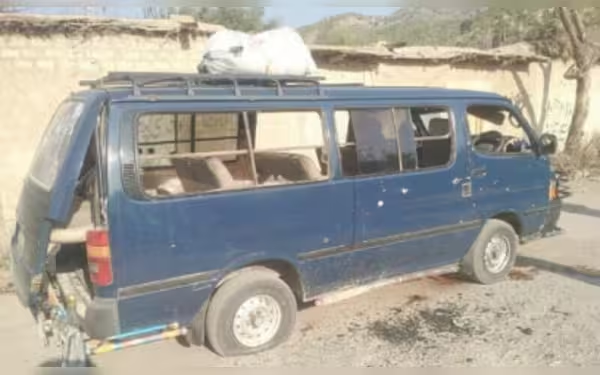Monday, December 23, 2024 05:56 AM
Kurram Attack: Death Toll Rises to 42 Amid Sectarian Violence
- Death toll from Kurram attack reaches 42.
- Over 30 individuals injured in the shooting.
- Political leaders condemn the brutal attack.
 Image Credits: dawn
Image Credits: dawnThe Kurram passenger vans attack has left 42 dead and over 30 injured, highlighting ongoing sectarian violence in Khyber Pakhtunkhwa.
The recent gun attack on passenger vans in Khyber Pakhtunkhwa’s Lower Kurram has shocked the nation, as the death toll has tragically risen to 42, with over 30 individuals injured. This incident, which occurred on Thursday in the Mandori Charkhel area, highlights the ongoing issues of sectarian violence and land disputes that have plagued this region for years. The local deputy commissioner, Javedullah Mehsud, confirmed the casualties, noting that among the deceased were seven women and a nine-year-old girl.
The convoy, consisting of approximately 200 vehicles, was traveling from Parachinar to Peshawar when it came under heavy gunfire. Reports indicate that two separate convoys of Shia passengers were targeted in this brutal attack. The local authorities are working diligently to provide medical assistance to the injured, while the bodies of the deceased have been transported to Parachinar.
In the aftermath of the attack, schools and markets in the area have been closed, and there are concerns that tensions may escalate further. Eyewitness accounts reveal the chaos that unfolded during the shooting. One survivor, Ajmeer Hussain, recounted the harrowing experience, stating, "Gunfire suddenly erupted, and I started reciting my prayers, thinking these were my final moments." His account reflects the fear and uncertainty that many in the region are currently facing.
The attack has drawn widespread condemnation from various political leaders, including Prime Minister Shehbaz Sharif and President Asif Ali Zardari. The United States also expressed its disapproval, with a spokesperson stating that the attack was "horrific" and extended condolences to the victims' families. Iranian Foreign Minister Abbas Araghchi condemned the violence as well, emphasizing the need for collective efforts to combat terrorism.
Kurram district, which shares a border with Afghanistan, has a long history of sectarian violence, often exacerbated by disputes over land ownership. Despite the government's previous attempts to address these issues through the establishment of a land commission, the situation remains precarious. Local tribal leaders have called for immediate action to ensure the safety of stranded passengers and to protect those who are injured.
This tragic incident is part of a larger pattern of increasing violence in Khyber Pakhtunkhwa and Balochistan, where security personnel have faced significant threats. The recent uptick in attacks, particularly after the Tehreek-i-Taliban Pakistan (TTP) broke a ceasefire agreement, raises serious concerns about the safety and security of citizens in these regions.
As the nation mourns the loss of innocent lives, it is crucial for the government and security forces to take decisive action to restore peace and security. The people of Pakistan deserve to live without fear and to feel safe in their daily lives. It is a collective responsibility to ensure that such tragedies do not occur again, and that the rights and safety of all citizens are upheld.













